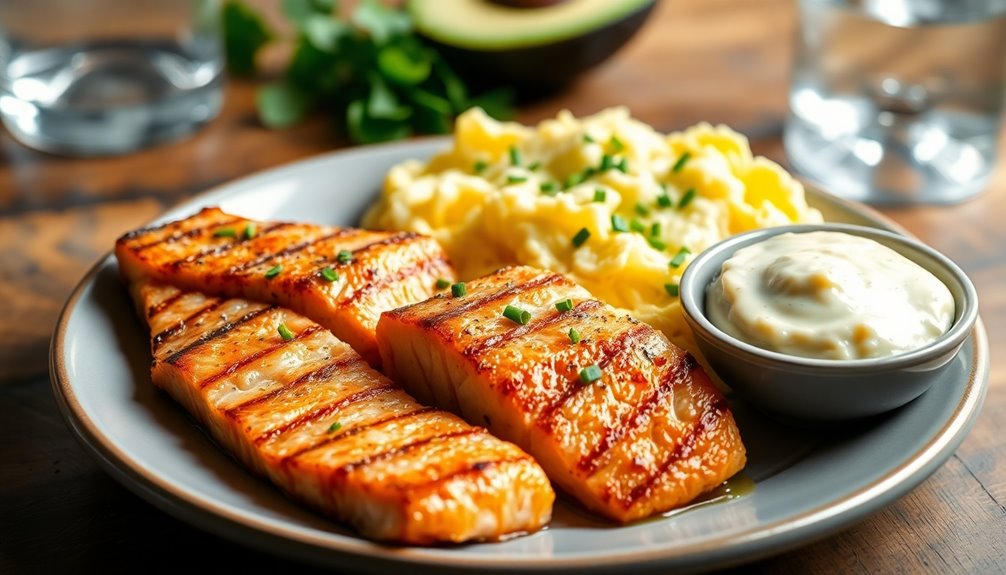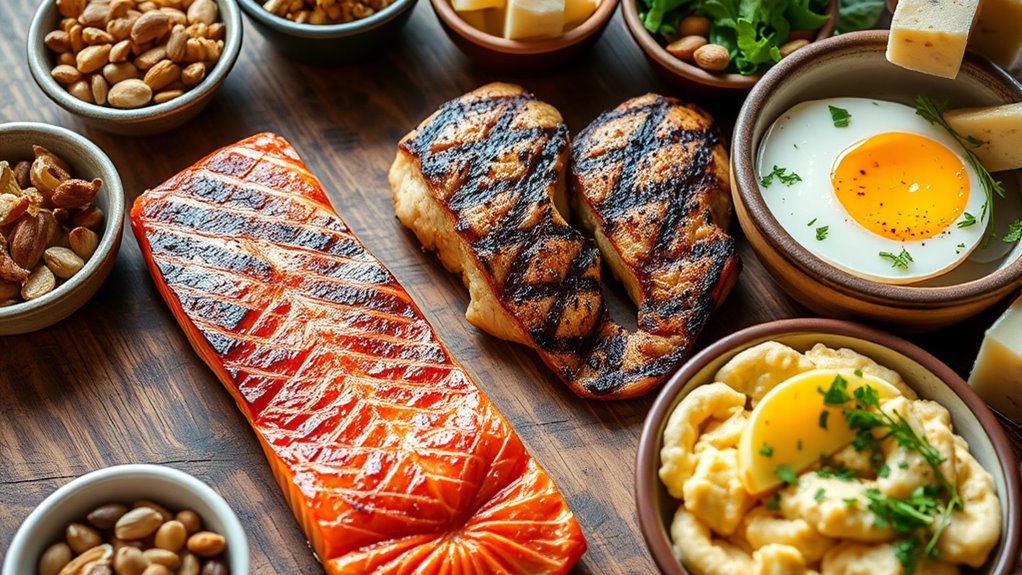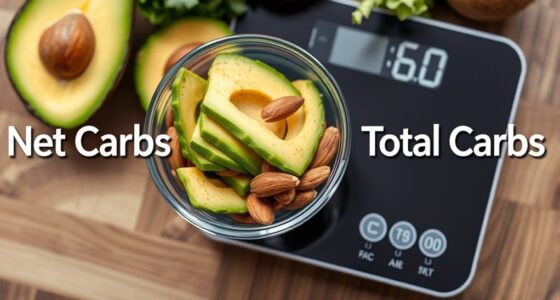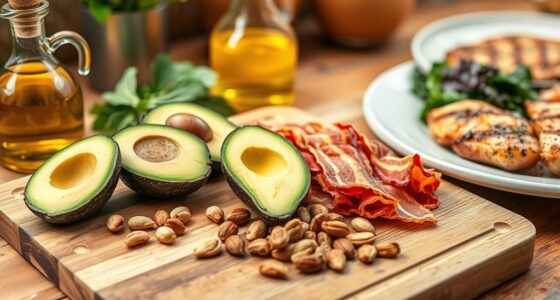Finding the right protein balance on keto is key to supporting muscle, recovery, and staying in ketosis. Aim for about 20-25% of your daily calories from moderate, evenly spaced protein sources like eggs, meat, or fish. Too much protein can turn into glucose and stall ketosis, while too little risks muscle loss. Monitoring your intake and adjusting based on activity and goals helps you stay on track—keep going to learn how to fine-tune your approach.
Key Takeaways
- Aim for moderate protein intake, about 20-25% of daily calories, to support muscle maintenance without disrupting ketosis.
- Spread protein evenly across meals to maintain stable blood sugar and prevent insulin spikes.
- Choose nutrient-dense, whole food sources like eggs, meats, fish, and dairy for optimal health and satiety.
- Utilize keto-friendly protein supplements, such as whey or collagen, to meet needs without excess carbs.
- Adjust protein levels based on activity, goals, and body response to optimize ketosis and muscle preservation.

Have you ever wondered how protein fits into a ketogenic diet? If you’re aiming to stay in ketosis while meeting your nutritional needs, understanding the role of protein is essential. One of the key factors to consider is meal timing. When you eat protein throughout the day can impact your blood sugar levels and how easily you stay in ketosis. Spreading your protein intake evenly across meals helps prevent spikes in insulin, which can kick you out of ketosis. For example, including moderate amounts of protein in each meal ensures your body has a steady supply for muscle repair and maintenance without overwhelming your system. It’s also wise to avoid large, protein-heavy meals close to bedtime because digestion can interfere with sleep and may affect ketosis.
Spreading protein evenly across meals helps maintain ketosis and supports muscle repair.
In addition to meal timing, supplement options can be valuable for optimizing your protein intake on keto. If you find it challenging to get enough protein from food alone, there are keto-friendly supplements available. Protein powders like whey, collagen, or plant-based options can be convenient, especially post-workout or during busy days. Just be sure to choose products with minimal carbs and no added sugars, as these can quickly add up and disrupt ketosis. Some people also use amino acid supplements, such as BCAAs, to support muscle recovery without substantially affecting their carb count. Remember, supplements should complement your diet, not replace whole foods. Whole food sources like eggs, meats, fish, and dairy are preferable for their nutrient density, but supplements can fill in gaps when needed. Additionally, understanding protein metabolism can help you better tailor your intake to support your goals. Incorporating a variety of nutrient-dense foods not only enhances your overall health but also supports optimal protein utilization, which is vital for maintaining muscle while on keto. Moreover, staying informed about paint sprayer reviews and using the right tools can make your painting projects more efficient and enjoyable, ensuring a smooth finish every time.
Finding the right balance involves listening to your body and adjusting your intake based on your activity level, goals, and how your body responds. If you’re training intensely or trying to build muscle, you might require more protein, but always keep an eye on your overall carb intake. Too much protein can sometimes convert into glucose through a process called gluconeogenesis, which could hinder ketosis. Conversely, too little protein might lead to muscle loss and decreased satiety. Aiming for a moderate protein intake—generally around 20-25% of your total daily calories—works well for many on keto, but individual needs vary.
Ultimately, by paying attention to meal timing and choosing the right supplement options, you can fine-tune your protein intake to support your keto journey. Staying consistent, monitoring your progress, and adjusting as needed will help you find the perfect balance. With a strategic approach, protein becomes a powerful tool to help you reach your health and fitness goals while maintaining ketosis.
Frequently Asked Questions
Can Vegetarians Meet Their Protein Needs on Keto?
You can meet your protein needs on keto as a vegetarian by focusing on plant proteins and vegetarian sources. Incorporate foods like tofu, tempeh, seitan, and edamame for high-quality options. Nuts, seeds, and certain vegetables also contribute protein. By combining these sources, you guarantee you’re getting enough protein while staying in ketosis. Planning your meals carefully helps you balance your protein intake with your keto goals effectively.
How Does Excessive Protein Affect Ketosis?
Excessive protein intake can impact your ketosis because your body may convert surplus protein into glucose through a process called protein absorption. This process can raise your blood sugar levels, potentially disrupting ketosis. To preserve muscle and stay in ketosis, you should balance your protein intake carefully, ensuring you get enough for muscle preservation without overdoing it, which could hinder your fat-burning goals.
Are Plant-Based Proteins Sufficient for Keto Goals?
Think of plant-based proteins as a colorful toolkit for your keto journey. While they’re rich in nutrients, some plant options may not provide as much protein absorption as animal sources. You’ll need to select high-quality plant-based options like nuts, seeds, and legumes, but keep an eye on carb content. Balancing these choices helps you stay in ketosis while meeting your protein needs, making your keto adventure sustainable and satisfying.
What Are the Best Keto-Friendly Protein Sources?
You should choose keto-friendly protein sources that offer high-quality protein, ensuring ideal protein absorption and complete amino acid profiles. Options like eggs, fatty fish, and poultry are excellent because they provide essential amino acids your body needs. Plant-based proteins can supplement your diet, but focus on those with complete amino acid profiles to meet your goals. Combining different sources helps improve absorption and provides a balanced amino acid intake.
How Do I Adjust Protein Intake During Weight Loss?
To adjust your protein intake during weight loss, monitor how your body responds to changes in protein absorption and metabolic adaptation. You might need to slightly decrease your intake if you’re losing muscle mass or feel sluggish, but guarantee you still get enough to support satiety and preserve lean muscle. Listen to your body, track your progress, and make gradual adjustments to maintain a healthy balance that supports your goals.
Conclusion
As you navigate your keto journey, think of your protein intake as the steady rhythm guiding your path through lush, green forests and sunlit clearings. Balance it just right, like the gentle sway of branches, to fuel your body without tipping the scales. With mindful choices, you’ll craft a vibrant tapestry of energy and health, where each step feels natural and purposeful—your goals shimmering ahead like a distant horizon, inviting you to keep moving forward.









